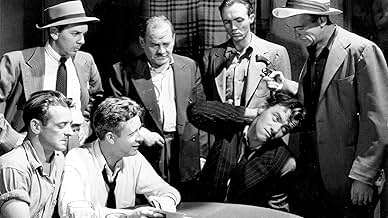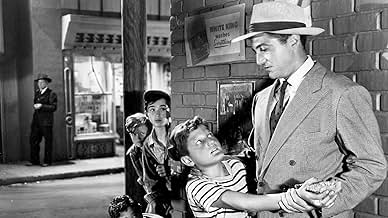Newlyweds come to visit groom's friend, only to discover him missing; and their investigation uncovers evidence of a ring of anti-semites terrorizing the neighborhood.Newlyweds come to visit groom's friend, only to discover him missing; and their investigation uncovers evidence of a ring of anti-semites terrorizing the neighborhood.Newlyweds come to visit groom's friend, only to discover him missing; and their investigation uncovers evidence of a ring of anti-semites terrorizing the neighborhood.
Tommy Noonan
- Bob - Barfly
- (as Tom Noonan)
William H. O'Brien
- Funeral Administrator
- (uncredited)
Featured reviews
The late 1940s saw a brief spate of message movies dealing with anti-semitism, most notably the fantastic film noir thriller CROSSFIRE and the more famous but somewhat tepid GENTLEMAN'S AGREEMENT (both 1947). OPEN SECRET, from 1948, shares more in common with CROSSFIRE given its noir trappings and thriller elements. John Ireland plays ex-GI Paul Lester who, along with his new wife Nancy (the very alluring Jane Randolph) arrive in town with the hopes of visiting Paul's old army buddy, Ed Stevens. When Ed turns up missing, Paul and Nancy are tossed into the middle of a dark mystery involving a neighborhood hate group whose targets are ethnic immigrant residents and business owners. Chief among them is Harry Strauss (George Tyne) a Jewish camera shop owner who figures prominently in the search for Ed who, it turns out, has been hunted down and killed by the hate-mongers because of incriminating photographs involving a previous killing that were in his possession. The direction (by John Reinhardt) of the film is considerably more lively than most ultra-low budget thrillers and the issues it brings up are actually on the level of those tackled in CROSSFIRE. Much of the dialog is quite intelligent and pungently written, dealing with delicate issues in a frank, straightforward way. Other notably interesting people in the cast are Roman Bohnen (the well-respected left-wing blacklisted actor) as an alcoholic wife-beater and member of the hate group, Sheldon Leonard (a veteran of tons of "B" noirs) as a sympathetic cop and, in a background bit part, King Donovan (from Don Siegel's "Invasion of the Body Snatchers"). OPEN SECRET has recently been released in a budget-priced DVD and I strongly urge fans of this hybrid noir genre to check it out.
An offbeat thriller,which is also a plea for tolerance and a strong indictment of ordinary anti -Semitism , shortly after WW2 (two of the characters ,including the principal ,are former army pals ; the prologue, which ends with an ominous word (guilty) , the shirt, the booklets John Ireland finds in the drawer ("he may use them to wrap up his rubbish") , and a menace hanging in the air , these criminal people always called "they" , all this makes a fine film noir.
"Open Secret" certainly owes a debt to "Crossfire," which came out a year earlier, but it stands on its own low-budget merits as not only a solid entry into the small field of 1940s films that dealt openly with racial and religious prejudice, but a very respectable noir thriller. The sets are simple, and there is no location footage at all -- but the director made up for that lack by using a great cast of character actors to portray some very hard-bitten men, women, and children, and, more unusually, he used sound in a dramatic way that continually moves the story forward while keeping the viewer in a state of jangled nervousness. Oh, yeah, its a very cool movie about antisemitism, of course; that goes without saying. But if you want to see it in purely filmic terms and don't care about the "message," it is equally cool. Watch for the fine low-key lighting and strange angle shots -- one of the best set-ups is Sheldon Leonard lounging akilter on a couch in his entry scene with a hugely close-up lamp and telephone in the foreground -- but also LISTEN for the doors opening and closing, telephones ringing, people screaming, sirens, noisy children, mumbling landlady, things dropping, drawers slamming; the sound effects are almost a Hitchcokian element in their own right. And pay attention to the continually changing status of the apartment door -- locked, unlocked, oops she forgot the key, locked, oops she left it open! -- there is a rhythmic and frightening quality to the door's continually shifting security status that is heightened by the always jarring sounds of intrusive door knockings and unexpected telephone rings. Considering what these folks had to work with, i think they succeeded admirably.
John Ireland and Jane Randolph star in "Open Secret" from 1948, featuring Sheldon Leonard and Arthur O'Connell.
Nancy and Paul Lester (Randolph and Ireland) arrive in town and call an old friend of Paul's, Ed (Charles Waldron Jr.) who invites them to stay in his apartment, as hotel rooms are scarce. However, he has to go out, so the landlady lets them in.
They never do see Ed - he seems to have vanished. They find some White Supremacist pamphlets in his apartment. When Paul wants to have some of his photos developed, he finds some rolls of film in a drawer and decides to get them printed for Ed. He goes to a film developer, Strauss. They meet a woman on the street who says she never goes there, "you know why."
Turns out the town is rabid with anti-Semites, who have a secret grouup that kills Jews. Ed, it seems, was investigating them.
This is a low-budget answer to "Crossfire" and "Gentlemens Agreement," but it had a sinister undercurrent and unpleasant tone throughout. You really wanted this newly married couple to leave town.
I unfortunately saw a very poor print of this that had a lot of dark scenes that were hard to see. However, it was well-directed and the acting was good.
Amazing to think we still have to deal with this in the U. S. today.
Nancy and Paul Lester (Randolph and Ireland) arrive in town and call an old friend of Paul's, Ed (Charles Waldron Jr.) who invites them to stay in his apartment, as hotel rooms are scarce. However, he has to go out, so the landlady lets them in.
They never do see Ed - he seems to have vanished. They find some White Supremacist pamphlets in his apartment. When Paul wants to have some of his photos developed, he finds some rolls of film in a drawer and decides to get them printed for Ed. He goes to a film developer, Strauss. They meet a woman on the street who says she never goes there, "you know why."
Turns out the town is rabid with anti-Semites, who have a secret grouup that kills Jews. Ed, it seems, was investigating them.
This is a low-budget answer to "Crossfire" and "Gentlemens Agreement," but it had a sinister undercurrent and unpleasant tone throughout. You really wanted this newly married couple to leave town.
I unfortunately saw a very poor print of this that had a lot of dark scenes that were hard to see. However, it was well-directed and the acting was good.
Amazing to think we still have to deal with this in the U. S. today.
In the late forties, theatre owners such as Harry Brandt made some feature films such as OPEN SECRET. The cast has some well known character actors, and the plot line is very interesting. However, two films with Humphrey Bogart had more dynamic punch to them that carries the same message through to today. BLACK LEGION is the premiere film in exposing the hate and venom of individuals who misunderstand the basics of the "American Way". ALL THROUGH THE NIGHT brings the message of Nazis and anti-semitism in the United States to a slightly less strong level. OPEN SECRET would be considered an attempt to emulate the work shown in the two above films. Viewed today, it looks like a low budget "B" movie.
Did you know
- TriviaThe soundtrack by Herschel Burke Gilbert was reworked in 1952 into a library of music cues for several TV shows including Adventures of Superman (1952), Captain Midnight (1954), Sky King (1951), Space Patrol (1950), Ramar of the Jungle (1952), and Racket Squad (1950). These appear on the Original Television Soundtrack CD for The Adventures of Superman, issued in 2000 by Varèse Sarabande.
- ConnectionsFeatured in John Reinhardt: Direction Without Borders (2022)
Details
- Release date
- Country of origin
- Language
- Also known as
- Secret deschis
- Filming locations
- Production company
- See more company credits at IMDbPro
- Runtime
- 1h 8m(68 min)
- Color
- Aspect ratio
- 1.37 : 1
Contribute to this page
Suggest an edit or add missing content































